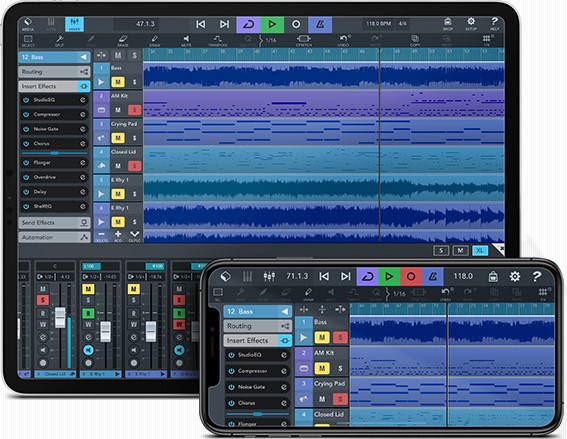
PianoVision
Price: £7.99
PianoVision is an augmented reality piano teaching app for Meta Quest VR headsets. The app works with Quest 2 and Quest 3 headsets (standalone headsets that don’t need to be connected to a computer). PianoVision has a host of augmented reality features, but perhaps the most outstanding is that you don’t need a piano or keyboard to play. The app can project a virtual keyboard onto any surface (including a ‘real-life’ piano or keyboard if you wish). As you play, you see colourful blocks (notes) descending onto the keyboard and lighting up the keys. The app pauses until you have played the correct note before letting you progress. There are 1400 songs and exercises, and you can upload MIDI files or sheet music. You can record your performances, and multiplayer options enable you to play duets with others anywhere in the world.
Yamaha HS3 and HS4 monitors
Price: HS3: £199, HS4: £279

HS3 and HS4 are two new compact, studio-quality monitors from Yamaha. They utilise class-D amplifiers, also known as ‘switching’ amps. Class Ds are smaller and lighter than other amp types and can produce more volume using less power. Using a single amp for two speakers reduces the weight of each pair of monitors. The HS3 monitors measure (W) 132 × (H) 223 × (D) 189mm with a combined weight of 4.9kg, while the HS4 measures (W) 150 × (H) 240 × (D) 213mm with a combined weight of 6.8kg.
Available in black or white, the monitors are built from sturdy MDF, with large cone woofers and soft dome tweeters that deliver accurate sound reproduction. The bass reflex port uses a ‘twisted flare port’ design to diffuse air and reduce noise. The power button, volume knob, and headphone connector are on the front of the units; on the rear, there are XLR/TRS, RCA, and stereo mini inputs along with controls to adjust the sound to suit the acoustics of your space.
Keystage MIDI 2.0 Keyboard
Price: 49 Keys: £499, 61 Keys: £599

 Korg’s Keystage keyboard is one of the first to harness the capabilities of MIDI 2.0 technology. Available with 49 or 61 semi-weighted keys, the keyboard is surprisingly portable and slim enough to fit on any desk. The 49-key version measures (W) 814 × (D) 234 × (H) 82mm and weighs 4.2kg. The 61-key version measures (W) 979 × (D) 234 × (H) 82mm and weighs 5.0 kg. MIDI 2.0 improves connectivity between devices, and Keystage offers plug-and-play compatibility with all major DAWs. Instant integration with Korg Gadget gives access to over 40 different synth sounds. The OLED screen is crystal clear, and knobs provide real-time adjustments and straightforward parameter control. Polyphonic aftertouch and MPE compatibility (MIDI Polyphonic Expression) allows for expressive play. An arpeggiator, various chord modes, and integrated audio outputs are included.
Korg’s Keystage keyboard is one of the first to harness the capabilities of MIDI 2.0 technology. Available with 49 or 61 semi-weighted keys, the keyboard is surprisingly portable and slim enough to fit on any desk. The 49-key version measures (W) 814 × (D) 234 × (H) 82mm and weighs 4.2kg. The 61-key version measures (W) 979 × (D) 234 × (H) 82mm and weighs 5.0 kg. MIDI 2.0 improves connectivity between devices, and Keystage offers plug-and-play compatibility with all major DAWs. Instant integration with Korg Gadget gives access to over 40 different synth sounds. The OLED screen is crystal clear, and knobs provide real-time adjustments and straightforward parameter control. Polyphonic aftertouch and MPE compatibility (MIDI Polyphonic Expression) allows for expressive play. An arpeggiator, various chord modes, and integrated audio outputs are included.
Cubasis 3.6
Price: App Store: £49.99, Google Play: £18.99 Free update for Cubasis 3 customers

The latest version of Steinberg’s Cubasis DAW app features unlimited tracks, a comprehensive mixer, multiple effects, and over 550 MIDI and audio loops. In version 3.6, you can now use Steinberg’s HALion software sampler on your mobile devices – a powerful plugin that gives you access to a wealth of software instruments. There are also four new VST instruments. LoFi Piano is included free and is based on an upright acoustic piano recorded with vintage microphones, which is ideal for creating a chilled-out vibe. Optional in-app purchases include the HALion Sonic Selection (a music library with over 1100 instruments – £19.99); Neo FM (a library of synth, bass and pad sounds – £12.99); and FM Classics (access the sounds of Yamaha’s DX7 and TX81Z synths – £12.99). Cubasis 3.6 works on iPhones, iPads and Android devices, but the iOS version offers more features.








